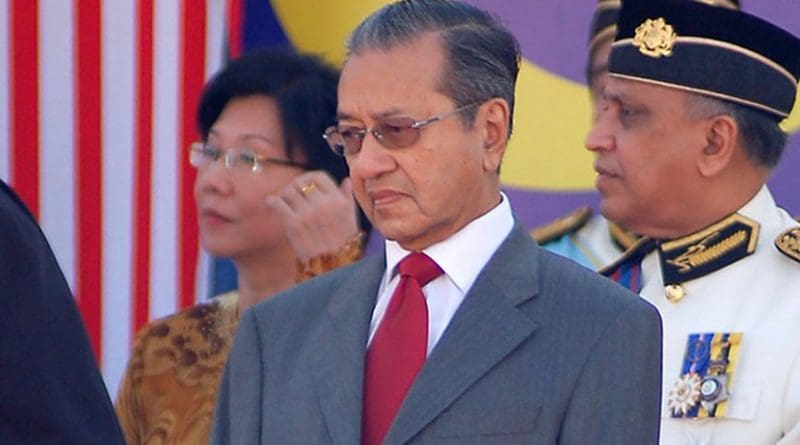Malaysia: Mahathir To Travel To China After Halting Projects
By BenarNews
By Muzliza Mustafa
The fate of at least two China-backed multi-billion dollar infrastructure projects in Malaysia hangs in the balance as Prime Minister Mahathir Mohamad travels to Beijing this week to push for their cancellation during his first visit to the Chinese capital since his party swept to power in landmark elections in May.
Mahathir has halted two gas pipes and a major railway project linked to China’s Belt and Road Initiative (BRI), claiming they are not cost effective. In addition, Malaysia is investigating to determine if the previous government of Prime Minister Najib Razak used funds earmarked for the pipelines to pay off debt accrued by the scandal-ridden 1Malaysia Development Berhad (1MDB).
Preparing for his five-day China trip beginning Friday, Mahathir told reporters that he will seek to cancel the projects – especially the two pipelines – while working to maintain good relations with the economic driver of Asia.
“We don’t think we need those two projects. We don’t think they are viable. So if we can we would like to just drop the projects,” he told the Associated Press.
The three contracts valued at more than 90 billion ringgit (U.S. $22 billion) were awarded by Najib’s government to Chinese state firms.
Mahathir decided to suspend their implementation after learning that the national debt his administration inherited had ballooned to more than 1 trillion ringgit ($244.6 billion).
Unfair conditions have been imposed on Malaysia along with the high interest rates tied to loans to complete these projects, said Awang Azman Awang Pawi, a professor at the Socio-culture Department of University of Malaya’s Academy Of Malay Studies
“The projects seem to be less beneficial to Malaysia, that’s how Mahathir sees it as it also did not involve the transfer of technology,” said the professor who monitors bilateral relations between the nations.
“This will be the main point. Malaysia wants to continue doing business with China and wants to be in its good books, but at the same time it will try to seek China’s help in reviewing the interest rate,” Awang Azman told BenarNews.
Announced with great fanfare in August 2017, Najib hailed the East Coast Rail Link (ECRL) as a game changer for Malaysia. The 688-km (430-mile) project spanning the states of Selangor, Pahang, Terengganu and Kelantan, was to be completed in 2024 at a cost of $13 billion backed mostly by loans from China.
The Malaysian government was to finance 85 percent of the project through loans carrying an interest rate of 3.25 percent from the Export-Import Bank of China.
In May, Mahathir said his government will renegotiate terms of the ERCL deal.
“The terms are very damaging to our economy,” he said at the time.
In July, Finance Minister Lim Guan Eng reported ECRL was halted and noted that the expected cost had increased by 26 billion ringgit ($6.4 billion) to 81 billion ringgit ($20 billion).
Trade partner
Even as Mahathir looks to drop at least two of the projects, China consistently remains Malaysia’s largest trading partner.
Total bilateral trade reached 290.65 billion ringgit ($70.9 billion) last year, in China’s favor to the tune of 38.35 billion ringgit ($9.35 billion), according to The Star newspaper.
Economist Barjoyai Bardai, a faculty member at the National University of Malaysia, said Mahathir’s trip is important for China because of the status of the three projects.
“Malaysia has been receptive to China’s initiative since the beginning and the Chinese government has to take this into the consideration. Without Malaysia, China’s BRI will be interrupted,” he told BenarNews, adding China needs to make the projects beneficial for Malaysia as well.
Najib had touted the BRI as a major beneficiary to Malaysia in terms of infrastructure, connectivity, social facilities, living standards and business opportunities.
BRI, proposed by President Xi Jinping five years ago, is China’s largest initiative to date to energize the global economy by constructing massive infrastructure revolving around transportation and energy.
Zhang Xiabo, professor of economics at the National School of Development at Peking University, said the two nations need more bilateral exchanges and need to eliminate the air of uncertainty temporarily clouding their relationship.
“It will be bad for the bilateral ties if the two countries engage in a war of words and do nothing else. In point of fact, the fundamental foundation for the China-Malaysia ties has not been shaken at all. The two countries still maintain a favorable relationship,” he said.

